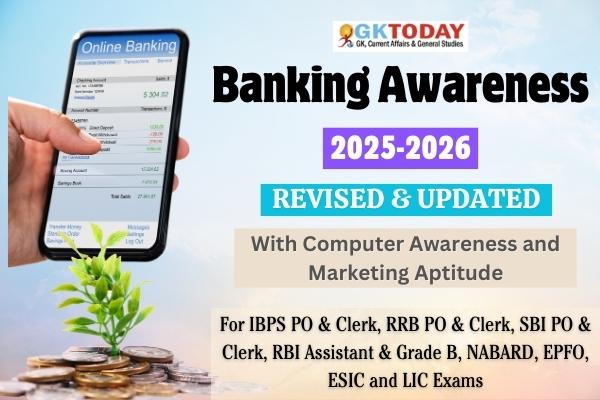Banking & General Financial Awareness
Banking & General Financial Awareness Multiple Choice Questions (MCQs) and Answers with explanation for All Banking Exams of 2024-25 such as IBPS Bank PO, IBPS Bank Clerical, RRB PO and Clerical, SBI PO and SBI Clerical, IBPS Recruitments, RBI Grade B and RBI Banking Examinations.
1. The most active segment of the Money Market in India is which one of the following?
[A] Call Money / Notice Money Market
[B] Repo / Reverse Repo
[C] Commercial Paper (CP)
[D] Certificate of Deposit (CD)
Show Answer
Correct Answer: A [Call Money / Notice Money Market]
Notes:
Call Money / Notice Money Market is the most active segment of the money market in India.
2. On which date, RBI started working?
[A] 1 January 1934
[B] 1 January 1935
[C] 1 April 1935
[D] 31 March 1934
Show Answer
Correct Answer: C [ 1 April 1935 ]
Notes:
In 1935, Reserve Bank commenced operations as India’s central bank on April 1 as a private shareholders’ bank with a paid up capital of rupees five crore.
3. The Aadhaar (Targeted Delivery of Financial and Other Subsidies, Benefits and Services) Bill, 2016 was recently given legal backing by Supreme Court. This act was passed in LokSabha as a__:
[A] Ordinary Bill
[B] Money Bill
[C] Constitution Amendment Bill
[D] Financial Bill
Show Answer
Correct Answer: B [Money Bill]
Notes:
The Aadhaar (Targeted Delivery of Financial and Other Subsidies, Benefits and Services) Bill, 2016 was introduced by Minister of Finance, Mr. Arun Jaitley, in Lok Sabha on March 3, 2016. The Bill intends to provide for targeted delivery of subsidies and services to individuals by assigning them unique identity numbers, called Aadhaar numbers.
4. How many Aadhaar Enrolment and Update Centres in total are there in India?
[A] 17000
[B] 23000
[C] 11000
[D] 60000
Show Answer
Correct Answer: B [23000]
Notes:
The ASK will run along with over 35,000 Aadhaar Kendra already being run by banks, post offices, BSNL and state governments.
5. How many digits are there in a Aadhaar Virtual ID?
[A] 16 digits
[B] 12 digits
[C] 14 digits
[D] 11 digits
Show Answer
Correct Answer: A [16 digits]
Notes:
Aadhaar Virtual ID is a 16-digit temporary code that can be used for Aadhaar authentications. One can provide the UIDAI virtual ID instead of Aadhaar number to agencies and protect your Aadhaar details from being accessed by someone else.
6. India’s Foreign Exchange Reserve is maintained by which of the following institutions?
[A] RBI
[B] NABARD
[C] Central Government
[D] IMF
Show Answer
Correct Answer: A [RBI]
Notes:
Reserve Bank of India Act and the Foreign Exchange Management Act, 1999 set the legal provisions for governing the foreign exchange reserves. Reserve Bank of India accumulates foreign currency reserves by purchasing from authorized dealers in open market operations.
7. Where is the headquarter of Bharatiya Reserve Bank Note Mudran Private Limited located?
[A] Chennai
[B] New Delhi
[C] Hyderabad
[D] Bangalore
Show Answer
Correct Answer: D [Bangalore]
Notes:
The headquarter of Bharatiya Reserve Bank Note Mudran Private Limited is at Bangalore, Karnataka. It was established on 3rd February 1995. It designs, print and supply banknotes for the Reserve Bank of India(RBI).
8. Which was the first Cooperative Bank established in India?
[A] Bharat Co-operative Bank Limited
[B] Kangra Central Co-operative Bank Limited
[C] Anyonya Co-operative Bank Limited
[D] Abhyudaya Co-operative Bank
Show Answer
Correct Answer: C [Anyonya Co-operative Bank Limited]
Notes:
Anyonya Co-operative Bank Limited (ACBL) located in the city of Vadodara in Gujarat, is the first co-operative bank in India. It was asked to stop most of its operation in 2007 by the Reserve Bank of India.
9. Which of these was the first RRB to be set up in India?
[A] Gaur Gramin Bank
[B] Prathama Bank
[C] Arunachal Pradesh Rural Bank
[D] Himachal Gramin Bank
Show Answer
Correct Answer: B [Prathama Bank]
Notes:
The development process of RRBs started on 2nd October,1975,Gandhi Jayanti with the forming of the first RRB, the Prathama Bank(U.P.), with authorised capital of ₹5 crore at its inception.
10. Which of the following is not among the All India Financial Institutions (AIFI)?
[A] NABARD
[B] SIDBI
[C] Exim Bank
[D] RBI
Show Answer
Correct Answer: D [RBI ]
Notes:
There are four All India Financial Institutions (AIFI) in India viz. Export – Import Bank of India (Exim Bank), National Bank for Agriculture and Rural Development (NABARD), Small Industries Development Bank of India (SIDBI) and National Housing Bank (NHB). These four institutions play key role in Indian financial markets.

